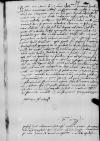Letter #1929
Ioannes DANTISCUS to Tiedemann GIESEHeilsberg (Lidzbark Warmiński), 1538-09-24
English register:
Dantiscus informs Giese that the long-awaited messenger [Mauritius] from Cracow arrived the previous night. He brought the endorsement of the Thorn (Toruń) articles, including the ius indigenatus requirements. Dantiscus is sending Giese a copy of this – still not unsealed – document.
The King [Sigismund I Jagiellon] has also agreed to the tax income being kept at Thorn Town Hall. Dantiscus is passing on to Giese the King’s letter to [Stanisław] Kostka on this matter, and copies of the royal letter postponing the next [Royal Prussian] Diet until spring, for distribution by the voivodes.
According to Dantiscus, they owe confirmation of the articles, and especially of the proper interpretation of the term indigena, to Samuel Maciejowski.
Dantiscus promises to spare no effort to make sure everything is ready for Giese’s consecration, despite the tailor’s absence (in the postscript he adds that the man has arrived). He has already summoned the Custos [of Ermland (Warmia), Felix Reich] to the ceremony; he should arrive [in Guttstadt (Dobre Miasto)] on Friday [27 September].
He assures Giese there was no need for him to apologise for opening the letter [addressed to Dantiscus].
Manuscript sources:
Prints:
| ||||||
Text & apparatus & commentaryPlain textText & commentaryText & apparatus
Reverendissimo Domino
Reverendissime mi Domine, frater et amice carissime et honoran(de) or honoran(dissime)⌈honoran(de)honoran(de) or honoran(dissime)⌉.
Salutem et fraterni amoris commendationem.
Hesterna nocte rediit is cf.
Evicimus item, quod pecuniae contributi
Opera reverendi domini decani Cracoviensis
Ex
Reverendissimae Dominationis Vestrae frater integerrimus
Postscript:
Postquam has obsignare statuissem, venit
De reseratis cf.


 BCz, 245, p. 78
BCz, 245, p. 78